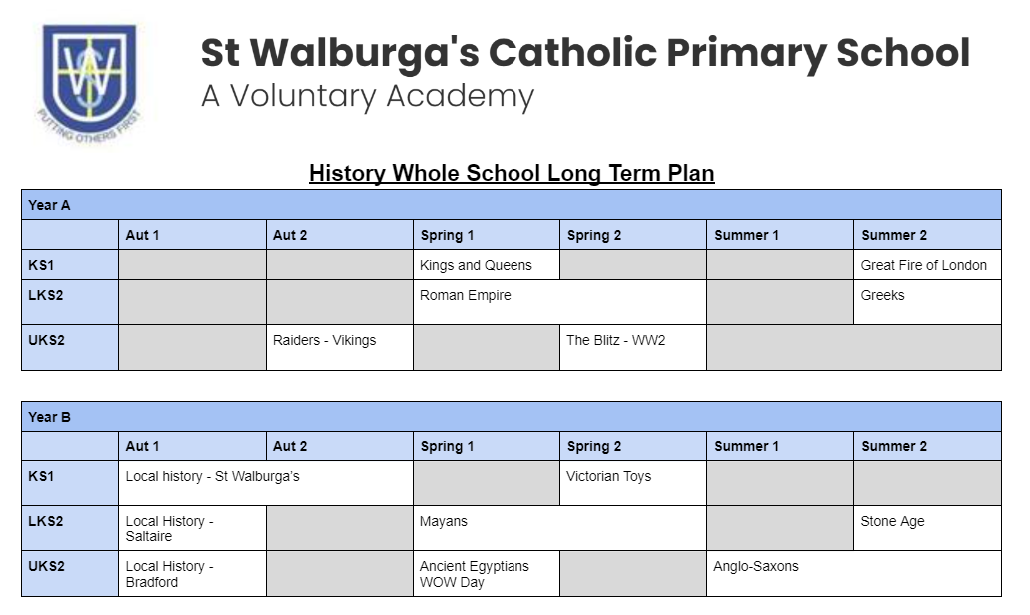History
Intent:
History helps you to understand the past, the things that have happened and the reasons why things are as they are. This also helps us learn from the past and make good decisions about the future.
History teaches us how places were in the past and the way they have changed and stayed the same. We study the lives of people in the past and learn how things were, how things have changed and how they compare to now.
With history, we can travel through time within our own lifetime and beyond!
Implementation:
At St Walburga's, history is rigorously planned to allow children to develop their own skills as historians. Our curriculum is based on the National Curriculum but we tailor our units so they carefully consider the cultural capital and they reflect the diversity of our learners.
- Our lessons follow a six week block, which is based on our ‘I can’ statements and exemplified in the learning journeys. They are planned to produce resilient, life-long historians.
- Skills, knowledge and vocabulary are a big focus in the history curriculum and are developed from Chris Quigley Essential skills. These skills are built upon as children progress through school, which ensures that children achieve the highest possible outcomes at their level.
- We follow rich and ambitious lines of enquiry by answering big questions. We teach children the knowledge they need in small steps to answer these challenging questions successfully. Studying history in this way inspires children’s curiosity, encourages them to ask critical questions and enables them to have a better understanding of the society in which they live and that of the wider world.
- When planning, we have identified key threads that run through the units of learning. These include invasion and settlement, legacy, empire, civilisation, monarchy and society. By mapping these themes across the units and revisiting them in different Key Stages and within different sequences of learning, we ensure children retain prior knowledge, build on prior knowledge and embed skills such as making links and gaining historical perspective, having a growing knowledge into different contexts, understanding the connections between local, national and international history and between short- and long-term timescales.
- Teaching is adaptive to ensure all children can access key learning and are appropriately stretched and challenged.
- Throughout the year, children have the opportunity to take part in many historical enrichments such as: school trips, visitors and WOW days. WOW days immerse children in interactive experiences based on the topic and period of time they are learning. For example, KS1 children take part in a Victorian classroom experience. We also utilise the local area as KS2 visit Saltaire village to observe the architecture of Salts Mill and compare its past use with its present use.
Impact:
Our children leave St Walburga’s with a well developed curiosity about people and events from the past; the skills needed to ask probing and reflective historical questions, and to seek appropriate answers to them; and a sense of responsibility for their role in ensuring that past mistakes are not repeated.
They are given a wide range of opportunities to:
-explore a wide range of skills and knowledge
-make sense of the world around them
-understand how events of the past have shaped the world that it is today
-consider their responsibilities on issues surrounding the environment, local and global communities
-develop new interests and hobbies
Long Term Plan






